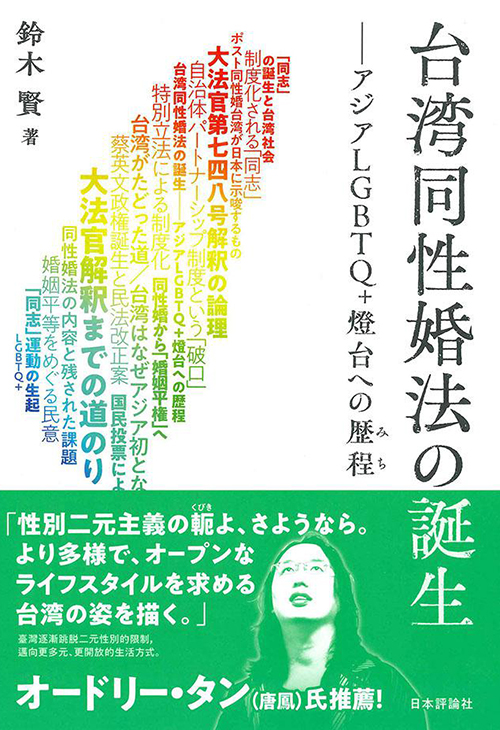아시아 북 어워드
Best Asian Books of the Year

The birth of same-sex marriage law in Taiwan(台湾同性婚法の誕生)
Japan, Suzuki Ken Nippon Hyoron Sha co.,Ltd
Author
Born in 1960. Graduated from the Graduate School of Legal Studies, Hokkaido University with a Ph.D. in 1991. Currently, he is Professor of Law at Meiji University and Professor Emeritus at Hokkaido University. He has been a visiting professor of law at National Taiwan University since 2022. He specializes in Chinese and Taiwanese law. He is the author of 『Principles of Modern Chinese Inheritance Law(現代中国相続法の原理)』(成文堂), 『Introduction to Modern Chinese Law(現代中国法入門)』(Co-authorship, 有斐閣), 『Summary of Chinese Law(要説中国法)』(Co-editorship, 東京大学出版会) and so on. He founded the Sapporo Meeting of HAS(Hokkaido Association of Sexual Minorities), a sexual minority organization, in 1989. In 1996, he organized a queer parade by sexual minorities in Sapporo (the second in Japan). Currently, he is an advisor to the Hokkaido GBT Network and an advisor to the “A group requesting a partnership system for local governments(自治体にパートナーシップ制度を求める会)”.
Publisher
Nihon Hyronsha Co.,Ltd (日本評論社)
Founded in 1918, Nihon Hyoronsha suffered through the trials of the Eijiro Kawai case and the Yokohama case, two of the most prominent press crackdowns of the Japanese Empire before its defeat in World War II. After the war, however, it established itself as a publisher of scholarly works in a wide range of fields, including law, economics, society, psychology, medicine, and the natural sciences. 『Horitsu Jiho(法律時報)』(1929), Academic magazines published arount 1960’s such as 『Legal Seminars(法学セミナー)』,『Economic Seminars(経済セミナー)』,『Math Seminars(数学セミナー)』, and 『Science of the Mind(こころの科学)』 have established a network of authors in their respective fields, making an indisputable contribution to Japan’s publishing culture. The publisher continues to publish extensively, primarily books based on these magazines.
In May 2019, Asia’s first same-sex marriage law was signed into law in Taiwan. This book chronicles the twists and turns that led up to this monumental law, exploring why it became a reality in Taiwan and how it has transformed Taiwanese society ever since.
The author is a researcher specializing in Chinese law and a longtime participant in the sexual minority movement in Japan. Since his long stay in Taiwan in 1999, he has been involved in local LGBTQ organizations (called “Tongzhi” in Taiwan), so he is able to convey the movement in Taiwan vividly. Although the book is written by a researcher, it contains a variety of stories and is written in a way that is accessible to the general public.
The content of this book can be summarized as follows.
First, it is a detailed and dramatic account of the process of legislation through all the political processes of judicial proceedings, referendums (direct democracy), and member’s bill(indirect democracy), with the words and thoughts of the various groups woven into the text.
In Taiwan, the “Tongzhi” movement has been growing since the 1990s, demanding human rights for sexual minorities. In 2009, TAPCPR(Taiwan Alliance to Promote Civil Partnership Rights) was formed, and the movement grew under the banner of “marriage equality,” seeking equal rights to marriage for homosexuals. In 2016, the Tsai Ing-wen goverment, which is supportive of the movement, introduced a bill to legalize same-sex marriage, but the legislation has been stalled due to strong opposition. With the legislative and executive branches stalled, in May 2017, the chief justice of the Constitutional Court of Taiwan issued <Interpretation No. 748>. It included an order to amend the law within two years as the Civil Code, which does not allow same-sex couples to marry, is unconstitutional as it violates the right to freedom and equality of marriage. Opponents of same-sex marriage sought to override the order by putting the issue to a “referendum,” which was scheduled to take place in November 2018. In the meantime, intense campaigning by both sides continued with TV debates and rallies. In the end, the referendum resulted in a victory for the opponents of same-sex marriage. Between the two different conclusions (the judicial decision and the popular will expressed in the referendum), the government sought to legislate. In May 2019, to accommodate the opposition, the government enacted a special law without the word “marriage” in the title, a compromise political solution that puts substance over form. The law allows civil unions to be registered.
This is the outline of the legislation. “when all options were exhausted, legislation was finally enacted,” the authors write, calling it a “rare case“. It’s an interesting practice and model of how the democratic process can be utilized. The authors emphasize that the process involved a wide range of issues from both proponents and opponents, and a lively public debate. The author notes that “a thick civil society surrounds the issue.” It can be said that this case shows the maturity of democracy and civil society.
The second feature of the book is that it focuses on the role of three words used in the movement: “Tongzhi”(meaning sexual minority), “gender”(meaning sexual diversity), and “婚姻平權”(meaning the equal right to the freedom to marry). By giving new meanings to words that already existed, social movements were able to unite around them and set society in motion. “The “invention” of the three-word frame is significant for the short-term success of Taiwan’s same-sex marriage legislation,” the authors write.
Just to give you an idea of how the word “Tongzhi(comrade)” works, Taiwan, like many other East Asian countries, has historically been characterized by strong oppression, prejudice, and hatred toward sexual minorities. In Taiwanese, gays and lesbians were referred to as “同性恋者” a term that had an unpleasant and ugly image attached to it, and was not something you wanted to say in public. By the 1990s, the social norm of heterosexuality as normal was changing, and colleagues who were “living as themselves” were called “Tongzhi” (originally used by Hong Kongers), and the term began to be used in place of “同性恋者”. LGBTQ+ people in Taiwan are all self-described as “Tongzhi”, allowing for solidarity among various sexual minorities. The widespread use of the word has also led to the erosion of negative stigma. The book emphasizes that the creation of the word played a major role in the expansion of the movement.
The third feature of the book is that it examines why Taiwan was the first country in Asia to enact the same-sex marriage law. The book makes three main arguments. First, because sexual minorities, hitherto invisible, have become visible in the public arena in a variety of ways, and issues surrounding sexual diversity have been politicized early on. Second, the regime at the time was clearly in favor of “marriage equality” and had a majority in the legislature, and the composition of the Constitutional Court was close to that of the proponents. Third, the book argues that Taiwan’s unique position internationally meant that pro-human rights forces, including same-sex marriage, were seen as a means of gaining their “external legitimacy” internationally, and that the issue of same-sex marriage had aspects of Taiwanese nationalism. All of these points are well documented and persuasively argued in the book.
According to the book, since the law went into effect, applications for same-sex marriage have been on the rise. Public opinion in favor of same-sex marriage has increased dramatically, and social attitudes are changing. Once a system is in place, society moves. Of course, there is still work to be done, but there is no doubt that it is a good step forward.
Same-sex marriage may seem like a specialized topic, but ensuring the human rights of minorities and creating a society that is inclusive and coexistent with diverse people is a common challenge in East Asia. This advanced and unique practice in Taiwan is in line with the changes in global society, and there is much for other East Asian countries to learn from it. This book is a worthy winner of this award because it conveys this message so well.
